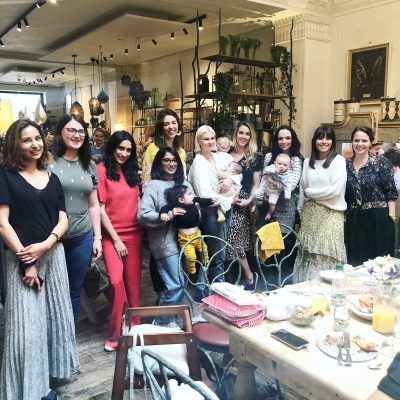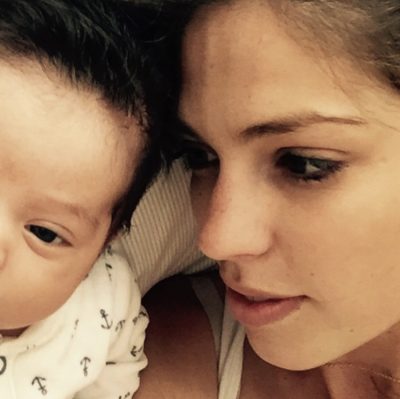Home » Motherhood » Tips for the parenthood-rollercoaster ride
(Sponsored post by Waterwipes)
What a rollercoaster parenthood is! However, a quick scroll through social media would often have us believe that we’re the only ones sitting on this hair-raising ride. It seems like comparison is king and we often feel like we’re the only ones winging it. I’m going to share my top parenting tips, both as a Psychotherapist and as mum of three.
In May, I was honoured to be asked to host and talk at a parents breakfast organised by WaterWipes for its new #ThisIsParenthood global project. Not only have I used WaterWipes’ super pure wipes for all three of my children (bye cotton wool and water), but I was really touched by the #ThisIsParenthood documentary, produced by the talented BAFTA nominated Lucy Cohen. Have you watched it? Here’s the link if you haven’t – grab a cuppa and a spare 15 minutes. The documentary shows a rare and candid insight into the realities of family life with a newborn, detailing some of the challenges that punctuate this crazy, special and map-less time. When WaterWipes showed us parents the footage during the breakfast, there wasn’t a single dry eye…I think due to the fact that, ultimately, we are all just trying to do our best! Sometimes we feel like we are scrambling around in the dark, sometimes we’re winging it, sometimes we’re smashing it (momentarily for me at least), but #ThisisParenthood.

A global study by WaterWipes revealed:
If only these results could shock me…but sadly, they didn’t. I receive messages on social media from 200-400 parents a day who feel like they are failing, or like they are alone in their struggles. Like WaterWipes, I am desperate for us to call a truce on this whole pretence. Yes, of course we will continue to share the highs, the smiles and the cute snaps. However, in order to shift this culture of toxic comparison, we all need to be a little more mindful that what we see, isn’t all there is.
Working with WaterWipes for #ThisIsParenthood was such a pleasure, and for those of you who couldn’t join us on the Instagram live, I thought I’d share the words I spoke:
My story
After my textbook pregnancy, birth and then newborn experience with my first little boy, I enjoyed the coffees and the relatively calm play dates. We laughed about our incessant Googling (ps. Dr Google is NOT your friend) and shared our thoughts on routines, and our moans about lack of sleep.

I made it through, and the key to that was the moment that I couldn’t hold up the pretence any longer. It was the moment I put my hands up and said #ThisIsParenthood for me. This is MY parenthood. And I found that my openness inspired the openness of others, and suddenly, I wasn’t alone anymore. And that changed everything.
So, I’ll share the words I shared at the breakfast. Why do we often feel like we’re failing? And what do we do about it?
Why?
Why do we often feel like we’re not enough? Why do we get so drawn into the half-stories of other people’s portrayal of their parenting experiences and feel led to believe that in comparison, we’re not doing quite so well?
From the conversations we had around the breakfast table at the brunch, I was so reminded of the truth that we’re all just trying to do our best at this parenthood lark, yet we all feel like we’re failing. Why? Expressions like ‘I hated myself for working’, ‘mum guilt’, ‘mummy fail’, ‘helpless’ were thrown around under pictures of our plates of pancakes and greek yogurt, as if they were permanent fixtures of our vocabulary. Are we really failing? Or are we just trying our best but being insanely hard on ourselves?

I remember that during one of my hardest parenting times, I strolled down the street pushing a double buggy towards a playgroup, wearing super-sized sunglasses in the blazing July heat. Any onlooker might have thought ‘Wow, look at that mum of two small children. She’s smashing it!’ The reality was that my glasses hid my tear-stained eyes, and nobody witnessed the conversation I’d had with my husband moments before. As I sat on my kitchen floor with two screaming children, I told him that ‘I can’t do this’. I meant it.
If we’re all in the same boat, how can we make sure that we stop feeling like we’re sailing alone? I’m going to share three tips that could shift this for ourselves. Because, really #ThisIsParenthood. It’s brilliant, and hard, and messy and wonderful.
What now?
Openness
Openness inspires openness. I remember meeting with my antenatal friends. The first time someone said that they were finding it hard, or arguing with their husbands over night feeds, or finding the bonding a struggle…it opened up a conversation. Sometimes there was an actual visible air of relief as people started to talk about the not-so-fun, challenging parts of parenting. One person’s disclosure gave the rest of us permission to share our true experiences.
Take little risks of openness. Be the conversation starter if you can. I always encourage my therapy clients to engage with at least two friends, family members or professionals who understand the reality of their circumstances. Talk to those who have a history of being kind and understanding towards you. It can feel challenging to start the conversation at first, but it gets easier, and often it inspires others to open up too.
So often, we fear that if we portray anything other than the highlights, we’d become a burden to people. Think of how honoured and how much closer to someone you feel when they open up to you! It’s an acceptance of love and friendship, and you’re just as worthy of the support of others as they are of yours.
Accepting support
Ask for help where you need it. Whether it’s practical, emotional, professional, online, offline, paid, unpaid. Asking for and accepting support is a statement of worth. You have to believe that you’re worth the support of others, which is why I encourage people to take little steps with this. It gets easier. It’s vital to thriving. Sometimes it really does take a village.
Self-care
Self-care is important. It’s not always about the huge gestures – the manicures, the long workouts, the massages. It’s also about attending to and meeting your basic needs. Listen to your body, look after it when you’re hungry. Drink water, get an early night when you can. It’s the little gestures that build up your self-worth. You wouldn’t let your child go hungry or thirsty, because you value their needs. You also need to value yours.
Self-care isn’t selfish. It’s about fuelling the car and respecting that it can’t function if it’s empty. Neither can you. I used to feel that self-care was indulgent and I didn’t feel worth it. Now I can clearly see how my family fully benefits from me not being burnt out and resentful of anyone who gets to pee alone!
So.
#ThisIsParenthood: it’s a wild ride, but we’re in it together. We really are. Sometimes it might feel like we aren’t and it might look like we’re the only ones covered in baby goo, with bags under our eyes, but we are not alone. The more shoulders we find to lean on, people that we can share the highs and the lows with regardless of how different their experience may be, and the more we talk openly about the realities of OUR parenthood journey, the more we will start feeling part of something bigger.
I’ve shared my #ThisIsParenthood story on Instagram. Have a search of the hashtag on Facebook and Instagram, and join in the project!

Let’s keep in touch
My monthly newsletter full of thoughts, tips and recommendations to inspire and encourage you through parenthood and sometimes an discount for one of my courses.

Anna is a mum of three, and a Psychotherapist, Author and Speaker. She is a warm communicator with a passion for taking therapy out of the therapy room.
Her hope is that through words, spoken or written, people will experience light-bulb moments, learn about themselves and be able to find more freedom and enjoyment in life.

Let’s keep in touch
My monthly newsletter full of thoughts, tips and recommendations to inspire and encourage you through parenthood and sometimes an discount for one of my courses.